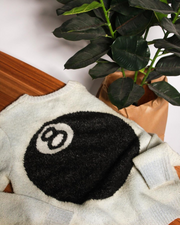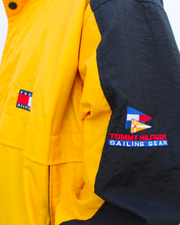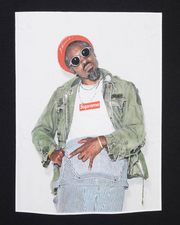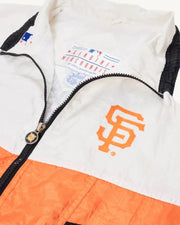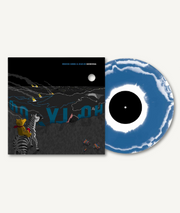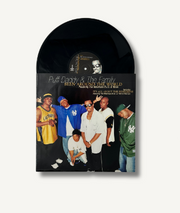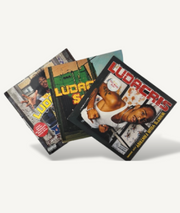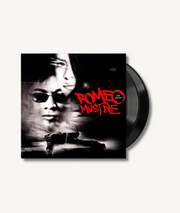In this exclusive interview for RRC Music in partnership with VNYLS, CRIMEAPPLE discusses the importance of traveling the world, avoiding being pigeonholed as a “Buddy Cop" rapper, and never taking himself too seriously.
Words by Khari Clarke
CRIMEAPPLE is a man of the people. Hailing from New Jersey with deep ties to South America by way of Colombia, CRIME is an artist whose approach to music is buoyed by an unabashed self-awareness, authenticity and a commitment to his fans.
Although he occupies a part of Hip Hop's landscape furnished by rappers like Roc Marciano, as well as Westside Gunn and his Griselda counterparts, he wields unique qualities in his arsenal foreign to the "Boom Bap" renaissance that has resurged over the past few years. While he raps primarily in English, CRIMEAPPLE can switch to Spanish and back to English with razor precision, all while maintaining this buttery flow, so much so that it might take you a bar or two to realize it happened.
He also functions almost completely autonomously. While many of his fellow so-called "independent" rappers receive sneaky support from major labels, CRIME handles all aspects of his operation internally and largely on his own. He has no PR team, no major label distribution, and, in relation to his line of "Manteca Worldwide" clothing – which regularly sells out moments after going live – he is extremely hands-on, even handling customer service and logistics.
Keeping the veil between himself and his fans extremely thin provides a unique nimbleness and a direct connection to the pulse of his supporters. He is acutely aware of everything from hilarious quips they may make about his appearance to how well his projects are received, which within this data-driven age is a precious resource to have direct access to. To put it succinctly, CRIMEAPPLE prefers to perform from within the crowd than the stage, which bolsters a camaraderie that is both wavering and ever-growing.
◆◆◆
This interview has been edited for conciseness and clarity.
So I guess the best place to start is probably from the top? How did you first start getting into rapping?
CRIMEAPPLE:
I mean, on a human level? Just like sneaking and stealing my older brother's tapes and wanting to just sing the songs.
And where did you grow up? In New York? New Jersey? There's a couple of places associated with you, so it's hard to pin down where you would've been.
CRIMEAPPLE:
Nah, yo, I was born in [New] Jersey. But yeah, I was just like stealing the stage and just wanting to sing the songs. And then somewhere down the line I started changing the lyrics to the songs, and then that somehow turns into, like, freestyling, right? Metamorphosis. And then eventually that turns into writing, which turns into plugging the cheap computer microphone into the boombox.
Word and how old are we talking? Like, what years are we talking about at this point?
CRIMEAPPLE:
I [was] young, man. Like, maybe 10–11.
And what's one of your most fondest songs that you were able to redo at that point?
CRIMEAPPLE:
I can't pinpoint one, but all the Bad Boy [Records] stuff.
[Laughing] Yeah. For some reason, I had a feeling. I was thinking along the lines of the Bad Boy—Biggie zone in my brain when you were saying it.
CRIMEAPPLE:
The Biggie stuff, Ma$e, Puffy shit. Just that whole thing.
And I guess growing up in Jersey, there's a lot of people that I associate with Jersey in terms of rap. You got Redman, you got Lauryn Hill—a bunch of people. How was it growing up out there and seeing these people rise to fame? And I guess what was the mood in Jersey during that time when you were coming up and those people popping off?
CRIMEAPPLE:
To be honest, it's like something that I guess wasn't like, too in my face when I was young besides maybe, like, Redman. Never really met any of the icons in Jersey. I was listening to a lot of West Coast rap, a lot of Death Row, a lot of [Ice] Cube, but Redman was like, the shit, for sure.
Yeah. Redman has to be a top ten, top five rapper.
CRIMEAPPLE:
Yeah. Also listened to some Queen Latifah joints, you know? Some Lords of the Underground—
You had The Artifacts out there–you had a couple top lyricists out there. I feel like lyricism and New Jersey go hand-in-hand, like New York started it, but we've had a bunch of different phases and sounds. But I feel like when you think about lyricism—when you think about people who started off and always had bars, and were bringing lyrics to the table, it feels like Jersey is that place.
CRIMEAPPLE:
Yeah, definitely, a whole lot. Coming up, it just wasn't something that I really thought of. It wasn't going to make me like them because they're from Jersey, you know what I'm saying? I was listening to music from all over the world.

Right right, so let's talk about your name, "CRIMEAPPLE", where does it come from?
CRIMEAPPLE:
Man, it was a juice I used to make.
[Laughs] You said it was a juice?
CRIMEAPPLE:
It's a juice, I used to have green juice or whatever. That was at a time when I was one of my only homies that had their own place, you know what I'm saying? We was all young when I was living on my own and shit, and a lot of the homies would just come over to my spot. This is like a long, long time ago, it's a different world now, like you can smoke weed outside, right?
Right, very different. True.
CRIMEAPPLE:
So if the homies would want to come blow it down, and not have to get accosted by police they'll come over to my spot. I would make green juice and just put a couple of miscellaneous ingredients in there, and just come up with an interesting name for it.
[Laughs]
CRIMEAPPLE:
But then it was time to choose a name, something I would just stay on people's minds when I left the stage. I couldn't really think of one and that was like the only word that I had made up in the last couple of years that just stood out to me.
[Laughs] That's funny. So tell me about your first time recording. At this point you've been repurposing songs that exist, you're switching lyrics out, you're starting to freestyle. At what age did you realize, "you know what, I actually have something here"? Because when you're a kid, and your friends are around, you're going to rap, you're going to record and stuff like that. But when was it like, "I actually have skills".
CRIMEAPPLE:
Shit….I mean, that's probably like 2010—2011? Like by then I'm actually booking studio time and shit like that.
How good are the raps at this point?
CRIMEAPPLE:
There's a lot of things that aren't good then, but there are a couple of things that are good, because a lot of the shit that came out—at least a lot of the verses that came out in 2017, '18, '19 on some of my first projects—were like verses that I had like repurposed and edited a little bit; verses from like 2009, 2010, 2011.
Yeah, because it's funny when I think about 2010, 2011, around that time rap was in a weird space. Like we just finished the “snap music” era and stuff like that. By 2010 people were getting back into lyrics. Like [J.]Cole, Kendrick [Lamar], and then A$AP Rocky, you had Odd Future, like a bunch of these "cliques” happening as well. But then like [Action] Bronson came through and Bronson felt different. And then it was like little by little, this resurgence happened, and it felt like you were able to ride the momentum of that and be able to pop off once things started going that way.
CRIMEAPPLE:
Yeah absolutely, that was the time where it was like a lot of Bronson, a lot of Willie [The Kid], a lot of Roc [Marciano] shit. Those are definitely important guys around that time.
Word, how’d that affect your craft?
CRIMEAPPLE:
It was like a validation to what I was doing, because I was always a fan of the Wu-Tang shit, Nas shit—the lyricism. And seeing those new guys come out in that era, that was like a great validation to not try to switch over and get on some more catchy shit or whatever, you know what I mean? Jump on a song with a bunch of snaps and high hats.
What would you call the space that you're currently in? Because you have a song "Gasoline Jump Shots", and you refer to yourself as an "underground rapper" but from my view you're very popular because I'm familiar with people in the space that you're in. How do you view yourself in this landscape of what rap is right now?
CRIMEAPPLE:
You know what? There's a couple of different names that I've heard for it. I still feel like underground is applicable just because it's not like Funkmaster Flex is playing my shit crazy. Like, DJs aren't playing the shit like that, so it still feels underground, you know what I'm saying? If you want to really catch some shit, you got to tap into satellite radio, or [Peter] Rosenberg on a Sunday night. For that reason, it still feels underground, right? But then maybe that's not the only pocket that I fit into.
Right, that's true.
CRIMEAPPLE:
It is a conflict because I'm also connecting with people in different countries and different continents.
Yeah and actually, I want to talk about that a bit. Latinos and rap have always gone hand-in-hand. Hip Hop started in the Bronx and there were always Latinos in Rap. But I feel like there's been a long gap between people like Big Pun, Fat Joe, The Beatnuts, and those guys who would rap in Spanish and English, or flip flop between the two. But I feel like you do it in a way where you don't know when it's coming, or maybe even that you might not even notice that you're switching between the two, you know what I mean? Has that always been your style? And I guess how did you decide that this was going to be your way of delivering your rhymes?
CRIMEAPPLE:
I think that might be the reason that it works for me, because it was never, like, a conscious decision, you know what I'm saying?
Yeah, word.
CRIMEAPPLE:
I let it happen, it's not like I'm planning to do it when I start writing a verse, my mind works in both languages, so I'm never really like—it's never preemptive. I think that's maybe why it works. But I could always freestyle English and Spanish, there was always both in the skillset.
Yeah, I think it's definitely an attribute that really sets you apart. I guess the most interesting thing is the fact that, for example, right now as we speak you're in Columbia, and in general it feels like you rep that hard. But I've seen in other interviews you mentioned, and even some of your songs, it sounds like you question your acceptance in the Colombian space. How have you been able to live through the duality of being a rapper in America but then also fitting in within the Latin American countries?
CRIMEAPPLE:
I leave it up to the people, I think it's really for them to embrace. I never force it, you know what I'm saying? It's the same thing with the lyrics. Nothing's too thought out. It wasn't like a strategy like, "I got to get big in Columbia". It was just me wanting to come out here. Even like the first album I did out here with [DJ] Muggs, it wasn't even my idea, per se. We just got on the phone, I was inviting him to just come kick it. I was coming on vacation, and then he was like, "Let's do the album out there."
Oh wow.
CRIMEAPPLE:
And I was like, "Yeah, for sure". And I remember the first time we came, and just being outside or whatever, people didn't really, really know who I was, they were like more hyped to see him. In the time since then, I've come back a lot, and I work out here with artists and have done shows and shit like that. So now it's different, I'll be walking around the streets of Columbia and people just know. So it was all organic, not like "I got to make things pop out there", I just wanted to be here.
When you work with one producer, no matter what, I feel like the advantage is it's always going to have the chance to sound way more cohesive...
How did you and DJ Muggs first connect?
CRIMEAPPLE:
I was in California doing a show and Ern Dog from Soul Assassins Radio had invited me to come host a show. I never met him or nothing like that, and actually had plans to leave, so I wasn't going to be able to make it. But he hit me and I guess I was like, a little conflicted on what to do, because I was like, "well, it's just a radio show. I could always come back. Is it really worth booking a whole 'nother flight?" And this is like 2017, '18—early on when having to book a whole new flight and a whole new hotel was like..
[Laughs] ..it was a lot of work. You got to call somebody, wait on the hold line and shit.
CRIMEAPPLE:
[Laughs] Right but even financially, right? Like "Shit, that's a couple thousand dollars I don't know if I can spend right now."
[Laughs] Facts.
CRIMEAPPLE:
But I remember looking—I was actually at Alchemist's house—and I remember looking a little, like, perplexed on what to do. And Alc was like, "What's up?" And I explained what was going on, and he was like, "Nah, Ern is calling? You got to go. You have to go." I didn't know Muggs was going to be there. But we met and everything was very organic, he was like "Yo, you want to do some music?" And we just hit it off from there, and then the next thing I know, we're just in Columbia doing an album.
Yeah and you guys have collaborated, what, like three, four, five projects at this point?
CRIMEAPPLE:
Yeah, like three whole projects. Yup.
Yeah, so do you prefer—because I don't think I've ever heard a project from you where it was you and a bunch of different producers. Do you prefer connecting with one producer and banging out the entire project versus splitting up a project amongst several different producers.
CRIMEAPPLE:
I feel like you definitely make an album way more cohesive when you work with one producer. I do have a handful where I try to play the executive producer role; I do like doing those because that's more of a challenge to me—picking the beats from the people that I fuck with and trying to make it work—like, that's the challenge. When you work with one producer, no matter what, I feel like the advantage is it's always going to have the chance to sound way more cohesive than if it were a bunch of people, right?
Yeah.
CRIMEAPPLE:
So I just try to pick and choose but I also don't ever want to overdo that type of thing and become the "Buddy Cop guy."
Yeah, yeah true.
CRIMEAPPLE:
That's why it's important for me to like [mix it up]. Those albums mean a lot to me. Those are like the ones where I'm in the driver's seat. I try to have a good balance of both.
Yeah, I know what you mean. I definitely think, like, someone comes to mind with the "Buddy Cop" thing is, like, Freddie Gibbs, for example. He's had projects by himself, but once he did the Madlib stuff, or once he did the Alchemist stuff, it's like now that is what you want from him. And it does take mixing it up and showing, like, "Nah, I can get off on anybody's beats. The magic isn't just here, I can do this everywhere." You know what I mean?
CRIMEAPPLE:
Yeah, exactly and that's the thing. Sometimes that can be what the fans prefer to hear and you run the risk of creating a situation where fans can get way more hype for the "Buddy Cop" album than something you're just putting out. So it could be a challenge, but I definitely like to do both–have to do both.
Right, and in terms of your music something that I've noticed is travel seems like a key aspect. Like you name drop places—you name drop Germany, you name drop Aruba—how important is travel in terms of your creative process?
CRIMEAPPLE:
So much! It's like huge, yeah, I can't even hide it. That's the thing, years ago, before I was in position to buy jewelry, it was like, jewelry was my shit. Thing is coming from where I'm from, a lot of people don't leave the east coast. A lot of people from like New York, Jersey, like the most they might do is go to Florida.
Yeah, Miami. I was about to say that same thing.
CRIMEAPPLE:
I have so many relatives and friends that have never even seen California.
Yeah, no, me too.
CRIMEAPPLE:
When you travel, it's like this thing is just like you see how big the world is and it's almost like a real surprise. I would have never thought that I'd be rapping and traveling; it's definitely motivating. Every time I'm recognized by someone or book a show somewhere, it's like—I feel I'm sure I could like lived life right where I was in Jersey, but I wouldn't have lived it at the same pace as if I was moving around. The experiences culturally definitely lends itself for more material.

Yeah, for sure. What's one of your favorite places that you didn't expect to have a visit in life but then you made it, then you're like, "I can't believe I'm actually here"? What country is that?
CRIMEAPPLE:
At first, definitely Paris was like that for me in the beginning. I've been to Paris a gang of times now, but that one of the first ones—I think that's the first city that I flew into the first time I went to Europe.
Wow!
CRIMEAPPLE:
So that was, like, nuts. [But now I] just go back, like, every year or whatever. And more recently I've been going to Italy.
Nice, yeah, I love Italy.
CRIMEAPPLE:
Yeah but outside of those two, I would say a big moment, too, was being in Teotihuacán in Mexico City. Like, pyramids and shit, the ruins. That was crazy!
Which one of those places inspired you the most? Like, you went there and you're like, "Oh, this is going to the bar as soon as I get a chance to write it down"?
CRIMEAPPLE:
You know what? I don't know if there's any one that stands out like that. I don't even just relate that to international travel.
Right, right.
CRIMEAPPLE:
That could be like, if I end up in Mamaroneck, New York [laughs]. You know what I'm saying? I'm always noticing —the names of places just stand out to me. If it's new me and I haven't been there, and I know it'll just sound different it's automatically going in a bar.
In terms of some other content—especially in the space that you're in—most people take themselves way too seriously, and it feels like you do take yourself seriously too, but then you also have this jokey side. You have interludes where you'll have people talking shit about you or you'll poke fun at yourself. Where does that come from and how did you start adopting that into your creative process?
CRIMEAPPLE:
I feel like it comes from maybe like a self-awareness? Knowing that while I love my job, it's also me being able to break it down and step outside of myself and look at it from a different perspective. Like, yo, on one hand you could say this is like high art and we're trying to make timeless music and this, that and the third, which is true, right? But at the same time, I could also step outside of myself and look at it and be like, "Wow, my job is really to sit here and get on beats and tell everyone how good I am at doing it."
[Laughs]
CRIMEAPPLE:
You know what I'm saying? [laughs] It's that Larry David thing where it's like it's easy for me to just just poke fun at the whole shit? I do feel like it would just feel very corny to me to try to take myself super serious. I feel like the ability to have the humor in there is just me showcasing more humanity.
Yeah, it works well.
CRIMEAPPLE:
Yeah. It's not intentional, it's just—again, everything with me is organic. I'm not thinking about this ahead of time, but looking back at it, I think it might be one of the things that helps me resonate with people on a human level more. But yes, it's all part of the formula: comedy, sex and violence.
[Laughs] Yeah, that works, those are all things that's going to get people to adapt to you. The funny thing is too, like Ghostface Killah, right? He's my third favorite rapper of all time, but he does this thing that I hate, which is when he raps about explicit sex stuff. [Laughs] It's just like, he just goes too far sometimes. He has songs where it's like "A'ight bro, we get it." But I feel like you have sex stuff in your bars, but it's in a way that's not overly descriptive, but it's more braggy or whatever. Where did that comfort level come from? Like feeling comfortable doing that in a space where a lot of people on the “boom bap” beats wouldn't go there.
CRIMEAPPLE:
Again, it's like a human thing, right? It's a human thing. It's part of what we do...I mean hopefully, right?
[Laughs] True.
CRIMEAPPLE:
But yeah, I remember I read a review once—it might not be for everybody, you know what I'm saying? I know some people, they might not want to hear that shit and that's cool,you don't got to listen. I remember reading the review for one album and someone was like, "I'm like four songs into this CRIMEAPPLE: album and I've heard him talk about gettin’ his dick sucked like ten times"
[Laughs]
CRIMEAPPLE:
I don't think it's like too premeditated, it's just really what's going on—I'm really out here having sexual relations.
[Laughs] That might have to be the title of this piece.
CRIMEAPPLE:
[Laughs] Yeah I'm really being erotic, you know what I'm saying? So maybe it's like, one of those things too, right? I wasn't like super ladies man and shit coming up either. Like I was able to eventually find, like, a pretty cute girlfriend but it wasn't like that was my motion 24-7—I had homies that was like that, but that was never me.
Yeah, yeah I know what you mean.
CRIMEAPPLE:
Yeah, so it could be one of those things subconsciously—now I'm like my own psychiatrist. But it could be the fact that coming up, I wasn't necessarily always like a lady's man, and then I was thrust into this position where that became real routine for me. It's not like a formula that I thought out, but it's just like what my life is centered around, really. It's just like I like to laugh a lot, I love beautiful women, and when there's centrifugal force, [the content] is readily available.
I remember hearing someone say something like, "You've got to be able to envision how your "action figure" comes.
In terms of when you head into the studio and you're working on a project—you're working on music—do the concepts just come from a place of just things that have happened in your life or things that could eventually happen in your life? Because I know when I think about people like Roc Marci, for example, some of his raps are like, "all right, he probably—definitely did that!" And then some of it is like, "all right, he's capable of doing that, but maybe it never actually happened." How much of that goes into your workflow? Like "Oh, I did that last Wednesday, so I'm going to write about it now."
CRIMEAPPLE:
Yeah, a lot of it is that, I think behind closed doors, amongst my peers and close friends, I have been crowned, like king of being able to go through some shit and then putting it in a song the next day. We'll have a conversation in the studio and then I'll get in the booth and I'll keep the conversation going in my verse—translate in real life to the verse. At the same time I definitely don't rely solely on actual experiences, I think part of this is like the art.
Mmm, true.
CRIMEAPPLE:
You have to have some imagination. You're definitely going to touch on something that might not have happened. But another thing that we all know is life is of the tongue and death is of the tongue.
True.
CRIMEAPPLE:
So there's plenty of things that I have spoken about that might not have been, like, factual at the time I said it, and shortly thereafter—
It happened.
CRIMEAPPLE:
Yeah, you know what I mean? [Laughs] My DJ is always like, "Yo, rap about me, getting rich!"
[Laughs] So you have a bunch of catchphrases that you use like "manteca" and I think it's almost like—I'm sure it just shows like it's probably like a battle cry [laughs]. How important is having those kinds of touchpoints—like the butter emoji, the ad-libs that you use constantly—how important is that in terms of galvanizing people around your movement and your music?
CRIMEAPPLE:
I think it's pretty important. I remember it might have been like Danny Brown said it once—I could be wrong— whoever it was I remember hearing someone say something like, "You've got to be able to envision how your ‘action figure’ comes."
Yeah, wow. Interesting way to think about it.
CRIMEAPPLE:
And that's not like, set for life, that can always change, but you got to have those type of things. And I just fell into that "manteca" shit and the "butter" shit. I didn't know it was going to hit. It was just that's what I was talking, I was talking that shit.
Right, right.
CRIMEAPPLE:
And that's like a buzzword, especially for Latin Americans, it's a buzzword. It just resonates. When I started making the clothes and shit. People just hear the shit or they see it on a shirt and it's like, "What? I need that!" So it's definitely important; that's branding 101.
Yeah. It's funny, because I remember Jadakiss was calling himself "Montega” Jada. I feel like Americans were pronouncing that word wrong for mad years [laughs].
CRIMEAPPLE:
I love that shit. As a Hispanic, I personally never was like "I'm offended that they're mispronouncing it". I love that shit, just the fact that they're trying to say it, it felt like we were being included.

Yeah, so what about school? What student were you? Were you going all the time? Skipping class? Were you actually really good with your studies?
CRIMEAPPLE:
I was fantastic when I applied myself… I just didn't always have the best attention span. Definitely like a class clown, you know what I'm saying? Always making girls laugh and shit like that. But when I applied myself, you know what I'm saying? A's and B's, for sure.
Word.
CRIMEAPPLE:
My mom's an educator—
Yeah, same here.
CRIMEAPPLE:
So I couldn't not—you said “same here”?
Yeah. My mom's been a teacher her whole life. My grandma, too.
CRIMEAPPLE:
So I don't know if it was like this for you, right? But for me, coming up, there was no sick days. To have a sick day, I literally had to be terminally ill.
[Laughs] Yeah, yeah.
CRIMEAPPLE:
So that's part of it, too. I just had to be a good student, because if not, my mom was going to hear about it right away.
Right. My mom was the teacher in my school for a while, that shit was even worse.
CRIMEAPPLE:
Nah bro, same! Same shit, my older sister was like my substitute teacher for like, a month.
Damn!
CRIMEAPPLE:
Crazy! That was part of the household.
When I got sick, it was like, "you're going down to your mom's class, you're not going home." There were never no sick days. It was always like—
CRIMEAPPLE:
No sick days when there's teachers in the house!
Yup! So, I know I'm probably the 100th person to say this, but when I first heard you I didn't know what to expect you to look like, you know? I actually told Sonnyjim the same thing when we met a few months ago, because actually I thought Sonny was a white dude when I first heard him, because of the UK accent. But I guess in terms of your identity how has that experience been for you as a rapper? How do you feel about how you've been perceived based on appearance?
CRIMEAPPLE:
Shit, man, nowadays I don't really know if I feel any type of way about it. I could definitely remember coming up, you're trying to have a breakthrough and connect with people, and maybe it's like a point of concern. Because you're like—I remember my beard was like, dumb long—that was the whole shit like, "Damn, they're going [Action] Bronson you heavy".
Yeah, okay okay. I actually didn't think of him.
CRIMEAPPLE:
Based on appearance, you know what I'm saying? Sonically it's different—it's two different things.
Yeah, sonically very different.
CRIMEAPPLE:
But I think especially now, right? The biggest rapper in the world is, like, a Canadian Jew.
Yeah, true.
CRIMEAPPLE:
So I think it's just a different world when it comes to that. I think if the music is just like undeniable people are going to embrace what you look like.
What did it take for you to get to that point, though? I have to assume—like that's a very mature answer—but it takes time to get there. But when you were in the thick of it and your identity was coming into play, what conversations were you having yourself? And how are you traversing, and getting through that barrier?
CRIMEAPPLE:
If you know how to carry yourself out here and shit, and what type of shit you got on and what your style is—I knew what my style was. But I've definitely seen that where people might have been listening for a minute then you see like that wild tweet where it's like "I never expected CRIMEAPPLE to look like this" and it makes me laugh.
I guess it goes back to the “you being okay with yourself” thing. Because you put childhood pictures of yourself out all the time, like with the "You Don't Fuck With CRIMEAPPLE?" series and stuff like that. So it doesn't seem like something you're running from at all.
CRIMEAPPLE:
Nah, not at all. I mean, I remember early on, pre-CRIMEAPPLE days, I was toying with the idea of rocking the mask, you know what I'm saying? Because I wasn't sure. I definitely had to get to this place.
I guess one of the last things I wanted to ask is a big question, but what are you looking to accomplish in your career? What's your "sail off into the sunset" moment?
CRIMEAPPLE:
Shit, it's funny, right? I had old goals and have new goals now because the old goals were to just work for myself, right? Not to work for nobody and I'm not signed to nobody. Like that. I might have temporary licensing agreements or digital distribution, but that's not like, the same thing as, like, a record deal where you're answering to someone and you know. So, like, the main goal always was just to sound simple, but it was just to be able to live a comfortable life off of the shit I make and answer to nobody.
True, I feel that.
CRIMEAPPLE:
And I've been there for a minute now, a couple of years now. So I guess the new goals, you know, it's like, shit, one of the new goals is, like, don't fuck it up.
Yeah, yeah, [laughs] that's a big one. That's an important one.
CRIMEAPPLE:
It's like that balance too. Like, "don't fuck it up"meaning, I know my audience and I do believe in fan service, but also that balance of still being willing to experiment, and explore, and push myself to do other things too; like toe in that line.
Word.
CRIMEAPPLE:
But yeah, like I was telling you before, the incremental growth I think is going to be one of those things that serves me in the end with the ability to have longevity. And that's just another one of the goals, right? Just to be able to be here five years from now—ten years from now. Still making sure that my core audience is fucking with it, and still growing the audience. I think that's maybe one of the more modest goals. More practical ones—I would at least be nominated for a Grammy one day but I don't know if I operate in that stratosphere. But I have to know that you can never say never. ◆◆◆

